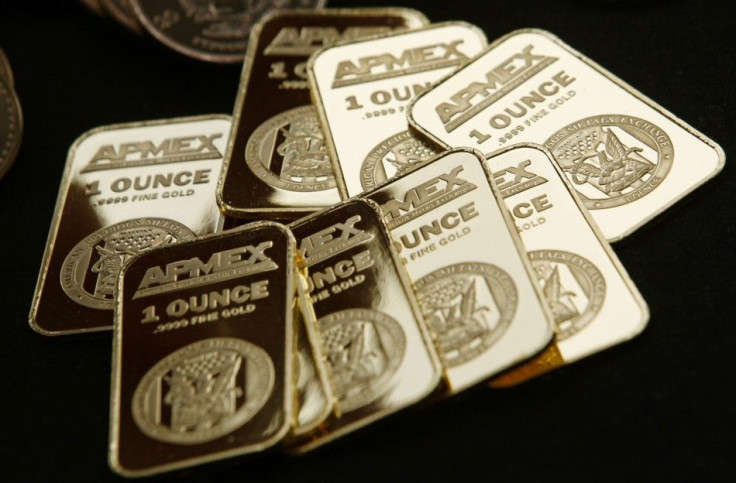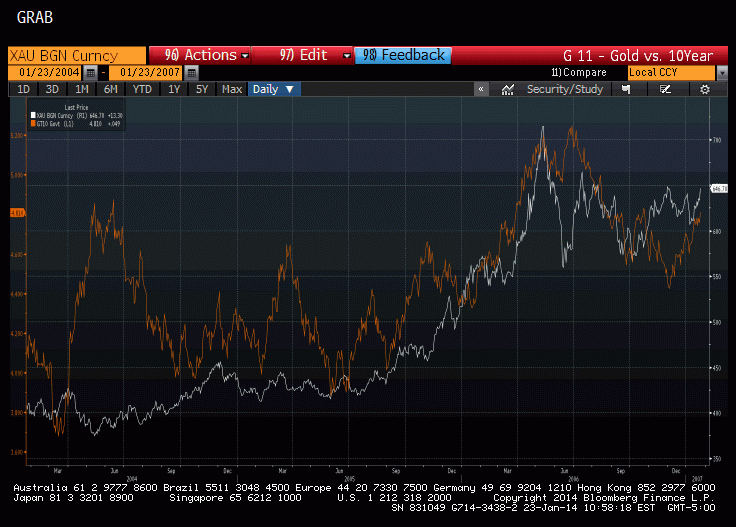Precious Metals: Market Strategist On Gold, Strikes & Central Banks [Q&A]

Chris Gaffney, a senior market strategist for Florida’s EverBank Financial Corp. (NYSE:EVER), discussed precious metals with IBTimes in a phone interview on Thursday. EverBank holds $17 billion in assets and $13 billion in deposits. Here are edited excerpts.
Q: U.S. economic data has arguably been the strongest driver of global gold prices in the past year. What’s your take on this relationship?
A: It has been dependent on U.S. economic data, but mainly because the ETF [exchange-traded] fund paper market has really dominated gold in price movements. Investors were moving into gold as that safe haven trade -- so as we saw more indications that the U.S. economy and the global economy in general was improving, we saw investors abandoning those safe haven trades, especially by selling the ETFs. They [ETFs] are obviously the easiest way for individual investors and funds to participate in the precious metals market.
Q: U.S. economic, housing and jobless claims data came out Thursday morning. How is gold likely to react to that data?
Today, I think prices are less dependent on the data. Jobless [unemployment benefit] claims came in just as expected. What I thought was interesting: The continued claims number stayed above 3 million. That’s in spite of the fact that a large number of people were taken off jobless claims at the end of the year, when the claims expired [due to Congressional failure to extend emergency unemployment benefits]. That is a worrying number for the labor market – that the continuing claims number is so high. That has maybe contributed to some of the price appreciation we’ve seen in gold this morning.
Q: Platinum miners in South Africa started strikes on Thursday. Gold miners could hold smaller strikes in early February. How will labor unrest impact markets?
A: The key there is violence. If you see any type of violence in these strikes then you see a much more dramatic surge in prices…The strikes do impact the supply side of the equation, but they’ve had intermittent strikes before and the companies have known that these were coming. It isn’t a surprise to the companies. So there probably was an opportunity to stockpile some supply leading up to the strikes.
Length is ultimately the important factor…Otherwise, we’ve only seen a little blip up here on prices. A month of strikes is not going to have a dramatic impact. If it drags on for perhaps three months, then you start seeing it really impact the supply…You could see a shortage develop on the platinum side.
As for gold, Russia’s recent statement that they’d lower gold production will have more impact on gold prices than these small South African strikes. We’re seeing miners start reducing production because of the low prices we’re seeing – Russia now is stating that they will reduce production. Obviously Russia is one of the larger producers.
Q: What are central banks likely to do with gold?
All of the quantitative easing we’ve seen, by the Bank of Japan, the Bank of England, the U.S. Federal Open Market Committee, as well as the cost of bailing out the peripheral European countries -- that’s created some demands on these central banks. One thing they can do to meet some obligations is to sell some of their assets, like gold, and central banks could move to sell even more assets as they try to deal with the debt they racked up during quantitative easing.
China is an exception to that. China is certainly adding to their gold holdings, and we’ll probably get that number sometime soon. It’s not very much of a secret that they could jump to the third largest gold holdings behind Germany and the U.S. eventually.
(Note: Central banks have been net buyers of gold for the past few years, though many European banks haven’t bought or sold sizeable amounts of gold.)
Most central banks bought their holdings at much cheaper levels than we are right now. So even with [steeply lower] gold prices, I don’t think there’s a bunch of worry about all the losses that these banks will sustain if they go and sell their holdings. (Switzerland’s central bank recently lost $16.5 billion in gold write-downs thanks to 2013’s price plunge.)
Q: How has gold been trading in relation to platinum and silver? Do you see platinum and palladium decoupling from gold, breaking free from its influence, as other analysts have predicted?
We own silver and platinum in our managed accounts through our wealth management arm. So we’ve put our money where our mouth is. We feel that those two are going to have a better appreciation in the coming year.
They are decoupling from gold. It goes back to the physical demand for platinum manufacturing and the automobile industry in particular…Silver also has more industrial uses than gold. Selling from ETFs has been dominated by gold, so I do think you’re going to see continued decoupling from gold.
Q: One influential forecaster has said gold could fall to $800 per ounce if bond yields rise to 4 percent, up from 2.8 percent now. What’s your take on bond yields and gold?
A: I really respect Erb [the forecaster]. However, I think his gold interest rate model is too myopic…Inflation will have a bigger influence on the future movement of gold’s price than interest rates…While the model did an excellent job of predicting the price of gold last year, if you take the same model over 2004 to 2007, I believe you will see the results are not as encouraging.

Yields on the 10 year Treasury bond marched steadily higher during this time and the price of gold also moved higher. This is in direct contradiction to Erb’s model.
I still believe gold will face too many headwinds in order to see any large price appreciation in 2014 – so I wouldn’t classify myself as a current gold bull.
(Note: Others have questioned the strength of the correlation between U.S. interest rates and gold prices. But it’s still common industry wisdom that interest rates are one of the strongest factors correlating with gold prices, if not the strongest, based on ample historical data.)
Q; Any last thoughts?
I think gold prices are going have a tough time seeing any kind of real rally in 2014.
© Copyright IBTimes 2024. All rights reserved.




















